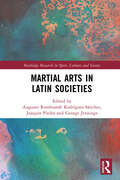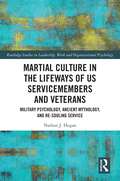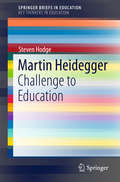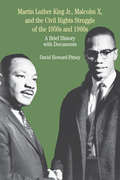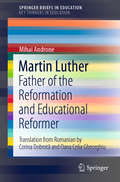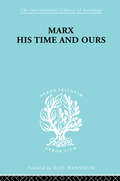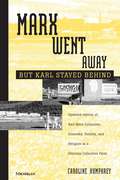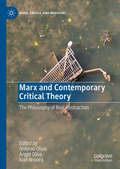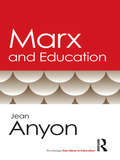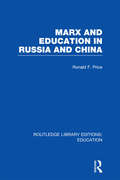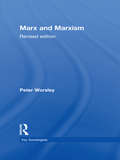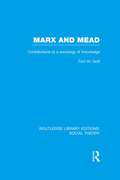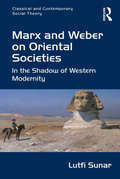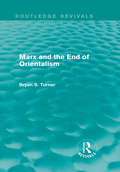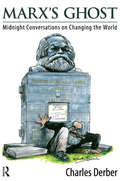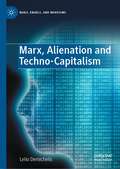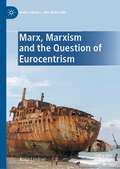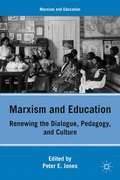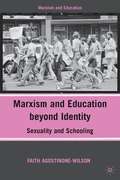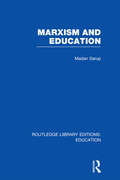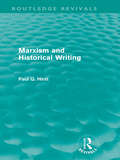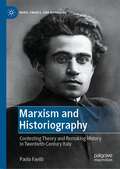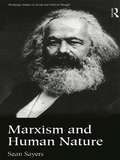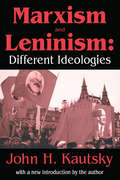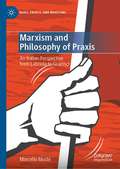- Table View
- List View
Martial Arts in Latin Societies (Routledge Research in Sport, Culture and Society)
by Rembrandt Rodríguez-Sánchez, AugustoThis is the first book to explore martial arts and combat sports in Latin societies. Covering well-known and rarely studied forms of fighting systems, it considers how the schools of thought, organisation, and stylistics of martial arts can shine new light on the culture, history, and social issues of Latin countries and postcolonial societies.Featuring the work of leading international martial arts scholars from around the world – some of whom are experienced practitioners, some apprentices, and some cultural critics of the martial arts – the book adopts a multidisciplinary approach, including anthropology, cultural and media studies, history, physical education, and sociology. It includes fascinating and in-depth case studies of topics as diverse as Capoeira and Brazilian Jiu-Jitsu, martial arts in urban Argentina, traditional wrestling forms from the Amazon region and Spain, boxe popolare in Italy, armed combat in the Philippines, and women’s wrestling in Spain.This book is fascinating reading for anybody with an interest in the sociology, history, culture or politics of sport, exercise, or physical culture as well as Latin American, European, or Asian studies or any of the diverse and broad traditions of martial arts.
Martial Culture in the Lifeways of US Servicemembers and Veterans: Military Psychology, Ancient Mythology, and Re-Souling Service (Routledge Studies in Leadership, Work and Organizational Psychology)
by Nathan J. HoganThis book develops a new concept—“martial culture”—with which to problematize and reframe thinking surrounding the lifeways of US servicemembers, by exploring the values, beliefs, norms, and rituals they are exposed to and practice during military service. By reuniting the two concepts of servicemember and veteran into one overarching cultural model, the author shows how the concept of martial culture can be used to acknowledge the unbroken, holistic, multidimensional life cycle of an individual. Adopting a comparative mythological approach and drawing upon Roman, Navajo, Hindu, Norse, and Japanese myths that speak to the lived experiences of servicemembers, veterans, and their families, it weaves together ancient voices and contemporary servicemember experiential existences to offer new insight into the psychological experience of servicemembers. It will be of strong interest to psychologists who seek to develop their treatment of veterans by understanding the unique lifeway of service without judgement and offering a balanced, integrated spiritual connection, while pushing back against both inaccurate assumptions of martial lifeways and the influences of industrialized secular approaches to service. It will also appeal to those within the fields of military sociology and psychology.
Martin Heidegger
by Steven HodgeThis book sets out to explore the challenge to education contained in Heidegger's work. His direct remarks about education are examined and placed in the broader context of his philosophy to create an account of Heidegger's challenge. Martin Heidegger is an undisputed giant of 20th Century thought. During his long academic career he made decisive contributions to philosophy, influencing a host of thinkers in the process including Arendt, Gadamer, Sartre, Merleau-Ponty, Derrida and Foucault. Heidegger inquired into the deepest levels of human being and its social, natural and technological contexts. Although he did not develop a systematic philosophy of education, his philosophical insights and occasional remarks about education make him an interesting and troubling figure for education. Heidegger is of interest to education for his contributions to our understanding of human being and its environment. Heidegger's insights are troubling, too, for many of the assumptions of education. His critiques of humanism and the modern instrumental mindset in particular have significant implications. The work of scholars who have expanded on Heidegger's remarks and those who have been influenced by his philosophy is also surveyed to fill out the examination. A vision of education emerges in which teachers and learners awaken to the deadening influences around them and become attuned to the openness of being.
Martin Luther King Jr., Malcolm X, and the Civil Rights Struggle of the 1950s and 1960s
by David Howard-PitneyThe civil rights movement’s most prominent leaders, Martin Luther King, Jr. (1929–1968) and Malcolm X (1925–1965), represent two wings of the revolt against racism: nonviolent resistance and revolution "by any means necessary." This volume presents the two leaders’ relationship to the civil rights movement beyond a simplified dualism. A rich selection of speeches, essays, and excerpts from Malcolm X’s autobiography and King’s sermons shows the breadth and range of each man’s philosophy, demonstrating their differences, similarities, and evolution over time. Organized into six topical groups, the documents allow students to compare the leaders’ views on subjects including integration, the American dream, means of struggle, and opposing racial philosophies. An interpretive introductory essay, chronology, selected bibliography, document headnotes, and questions for consideration provide further pedagogical support.
Martin Luther: Father of the Reformation and Educational Reformer (SpringerBriefs in Education)
by Mihai AndroneThis book explores specific aspects of Martin Luther’s ideas on education in general, and on religious education in particular, by comparing them to the views of other great sixteenth-century reformers: Huldrych Zwingli, John Calvin, and Philip Melanchthon. By doing so, the author highlights both the originality of the German reformer’s perspective, and the major impact of the main religious movement at the dawn of modernity on the development of public education in Western Europe. Although Martin Luther was a religious reformer par excellence, and not an educational theorist, a number of pedagogically significant ideas and ideals can be identified in his extensive theological work, which may also qualify him as an education reformer. The Protestant Reformation changed the world, bringing to the fore the relation between faith and education, and made the latter a public responsibility by proving that the spiritual enlightenment of youth, regardless of gender and social origin, is indissolubly linked to instruction in general, and especially to a more thorough understanding of the classical languages, arts, history and mathematics.
Marx His Times and Ours (International Library of Sociology #Vol. 9)
by Rudolf SchlesingerPublished in 1998, Marx His Time and Ours is a valuable contribution to the field of Sociology and Social Policy.
Marx Went Away - But Karl Stayed Behind: Economy, Society and Religion in a Siberian Collective Farm
by Caroline HumphreyWhen it appeared in 1983, Caroline Humphrey's Karl Marx Collective was the first detailed study of the Soviet collective farm system. Through careful ethnographic work on two collective farms operated in Buryat communities in Siberia, the author presented an absorbing--if dispiriting--account of the actual functioning of a planned economy at the local level. Now this classic work is back in print in a revised edition that adds new material from the author's most recent research in the former Soviet Union. In two new chapters she documents what has happened to the two farms in the collapsing Russian economy. She finds that collective farms are still the dominant agricultural forms, not out of nostalgic sentiment or loyalty to the Soviet ideal, but from economic and political necessity. Today the collectives are based on households and small groups coming together out of choice. There have been important resurgences in "traditional" thinking about kinship, genealogy, shamanism and mountain cults; and yet all of this is newly formed by its attempt to deal with post-Soviet realities.
Marx and Contemporary Critical Theory: The Philosophy of Real Abstraction (Marx, Engels, and Marxisms)
by Antonio Oliva Ángel Oliva Iván NovaraThis edited volume brings together an international and interdisciplinary group of scholars to explore the traces of the idea of “Real Abstraction” in Marx’s thought from the early to late writings, as well as the theoretical and practical consequences of this notion in the capitalist social system. Divided into two main parts, Part One reconstructs Marx’s notion of “Real Abstraction” and the influences of earlier thinkers (Berkley, Petty, Franklin, Feuerbach, Hegel) on his thoughts, as well as the further elaborations of this concept in later Marxist thinkers (Sohn-Rethel, Lukács, Lefebvre, Adorno and Postone). Part Two then considers the reverberations of the notion in the field of critical theory from a more abstract critique of capitalist social relations, to a more concrete understanding of historical movements. Taken together, the chapters in this volume offer a focused look at the concept of “Real Abstraction” in Marx.
Marx and Education (Routledge Key Ideas in Education)
by Jean AnyonThere was only one Karl Marx, but there have been a multitude of Marxisms. This concise, introductory book by internationally renowned scholar Jean Anyon centers on the ideas of Marx that have been used in education studies as a guide to theory, analysis, research, and practice. Marx and Education begins with a brief overview of basic Marxist ideas and terms and then traces some of the main points scholars in education have been articulating since the late 1970s. Following this trajectory, Anyon details how social class analysis has developed in research and theory, how understanding the roles of education in society is influenced by a Marxian lens, how the failures of urban school reform can be understood through the lens of political economy, and how cultural analysis has laid the foundation for critical pedagogy in US classrooms. She assesses ways neo-Marxist thought can contribute to our understanding of issues that have arisen more recently and how a Marxist analysis can be important to an adequate understanding and transformation of the future of education and the economy. By exemplifying what is relevant in Marx, and replacing that which has been outdone by historical events, Marx and Education aims to restore the utility of Marxism as a theoretical and practical tool for educators.
Marx and Education in Russia and China (Routledge Library Editions: Education)
by R F PriceTo many education students, Russian and/or Chinese education is at the same time their introduction to Marxism, and many students go no further. This book sets the record straight by giving a thorough introduction to the writings of Marx himself as they relate to education. It shows what Marxism implies for education, as aim, method and content. It then proceeds to compare educational developments in the former USSR and China in the light of this analysis, attempting to answer the question as to how Marxist this has been, in the schools and outside them.
Marx and Marxism (Key Sociologists)
by Peter WorsleyKarl Marx probably had more influence on the political course of the last century than any other social thinker. There are many different kinds of Marxism, and the Twentieth Century saw two huge Marxist states in total opposition to one another. In the West, Marxism has never presented a revolutionary threat to the established order, though it has taken root as the major theoretical critique of capitalist society in intellectual circles, and new interpretations of Marx's thought appear each year.Peter Worsley discusses all these major varieties of Marxism, distinguishing between those ideas which remain valid, those which are contestable, and those which should now be discarded. Rather than treating Marxism purely as a philosophy in the abstract, he concentrates upon the uses to which Marxism has been put and emphasises the connections between the theoretical debates and political struggles in the real world.
Marx and Mead: Contributions to a Sociology of Knowledge (Routledge Library Editions: Social Theory)
by Tom W. GoffIt has often been suggested that a resolution of issues generated by the sociological study of ideas might be reached through a synthesis of specific insights to be found in the works of Karl Marx and George Herbert Mead. The present study originated in an investigation of this hypothesis, particularly as it bears on the central issue of sociological relativism. The author began by delineating the specific problems such a synthesis might resolve, and in the process became aware that the nature and depth of differences separating the sociology of knowledge and its critics have never been fully analysed or understood. This volume therefore opens with a clarification of these differences, a clarification which leads to considerable redefinition of the problem as it has traditionally been understood by critics and proponents of the discipline alike. The author points out in particular that it is less a debate than a thorough-going contradiction which characterizes the literature dealing with the inadequacies of various formulations of the sociology of knowledge. In consequence, the study of Marx and Mead presented here is not simply yet another effort to discover a perspective which will satisfy the particular demands of the critics. Rather, it argues that an adequate perspective fully consistent with the central insight of the discipline – that knowledge is radically social in character – is to be found in a synthesis of elements in the perspectives of Marx and Mead.
Marx and Weber on Oriental Societies: In the Shadow of Western Modernity (Classical and Contemporary Social Theory)
by Lutfi SunarThe Orient was central to the work of Marx and Weber, both figures building their theories around the question of why modernity appeared to emerge only in the West. While Marx’s account focused on the accumulation of capital in the West, Weber’s explanation for this phenomenon centred on Western rationalization. Extending recent work comparing the social theories of Marx and Weber, this book examines their approaches to Oriental societies, showing how, in spite of the differences in their respective theorizations of the historical and political development of the West, their work on the form of modern society in the Orient converges, each complementing the other. Fully conversant with recent scholarly work on Marx and Weber, this comprehensive re-examination of the points of convergence and departure in their work requires us to re-evaluate both their positions in the history of sociology and their relevance to contemporary social questions. As such, it will appeal to scholars of social and political theory and classical sociology.
Marx and the End of Orientalism (Routledge Revivals #Vol. 7)
by Bryan S. TurnerFirst published in 1978, this title analyses a range of problems that arise in the study of North Africa and the Middle East, bridging the gap between studies of Sociology, Islam, and Marxism. Both Sociology and the study of Islam draw on an Orientalist tradition founded on an idealist epistemology, ethnocentric values and an evolutionary view of historical development. Bryan Turner challenges the basic assumptions of Orientalism by considering such issues as the social structure of Islamic society, the impact of capitalism in the Middle East, the effect of Israel on territories, revolutions, social classes and nationalism. A detailed and fascinating study, Marx and the End of Orientalism will be of particular interest to students studying the sociology of colonialism and development, Marxist sociology and sociological theory.
Marx's Ghost: Midnight Conversations on Changing the World
by Charles DerberRenowned American sociologist Charles Derber imagines a surprise encounter with Karl Marx's ghost in London's Highgate cemetery, leading to a night-long conversation about the problems plaguing the world. The economic crisis, climate change, war, the future of capitalism and the 'Arab Spring' are all discussed. The ghost reconsiders his theories as he speaks eloquently about American labour, environmental, gender and anti-racist struggles. The engrossing, funny and provocative conversation, with appearances from other ghosts such as John Maynard Keynes, offers new insights into the relevance and flaws of Marx's thought, indicating how we can get to a better world.
Marx, Alienation and Techno-Capitalism (Marx, Engels, and Marxisms)
by Lelio DemichelisIn this book, translated into English for the first time, Lelio Demichelis takes on a modern perspective of the concept/process of alienation. This concept—much more profound and widespread today than first described and denounced by Marx—has largely been forgotten and erased. Using the characters of Narcissus, Pygmalion and Prometheus, the author reinterprets and updates Marx, Nietzsche, Anders, Foucault and, in particular, critical theory and the Frankfurt School views on an administered society (where everything is automated and engineered, manifest today in algorithms, AI, machine learning and social networking) showing that, in a world where old and new forms of alienation come together, man is increasingly led to delegate (i.e. alienate) sovereignty, freedom, responsibility and the awareness of being alive.
Marx, Marxism and the Question of Eurocentrism (Marx, Engels, and Marxisms)
by Kolja LindnerThis book mediates between postcolonial positions that criticize Marxist approaches (and Marx’s writings) for their Eurocentrism and defenders of Marx, who claim that this accusation is a myth. In different contributions to this volume, Kolja Lindner pleads for a differentiated assessment of the whole of Marx’s work, including less known manuscripts, and a theoretical reconstruction of various elements that have come into the focus of postcolonial critique: ethnocentrism, Orientalism, false universalism and the oblivion of modernity’s global entanglement. Against this background, two opportunities simultaneously arise: Marx’s Eurocentrism can be deconstructed and his growing awareness of global developments and cosmopolitan struggles established.
Marxism and Education
by Peter E. JonesMarxist thinking can offer a critical understanding of education in an international context. Jones tackles these issues from a variety of angles and perspectives, taking advantage of recent theoretical innovations in Marxist analysis as well as the personal experiences of educational practitioners with Marxist commitments. With a specific focus on pedagogical practices as cultural practices, this book combines detailed case studies of local situations with broad, critical overviews of global development and challenges. "
Marxism and Education beyond Identity: Sexuality and Schooling
by Faith Agostinone-WilsonThis book seeks to revive dialectical materialist interpretations of sexuality, relevant to K-12 settings and society. Issues addressed include: sexuality and the curriculum, theories of the family, critiques of postmodernism, socialist feminism, and activist tactics/strategies for organizing in K-12 settings.
Marxism and Education: A Study of Phenomenological and Marxist Approaches to Education (Routledge Library Editions: Education)
by Madan SarupThis book introduces the student to the various phenomenological and humanistic Marxist perspectives as they are being applied to education and provides an account of the strengths and weaknesses of these perspectives, drawing on a variety of disciplines in order to explain the controversies described. The opening chapters deal with the phenomenological perspective in the sociology of education, discussing its adoption of a phenomenological model of man, its use of anthropological studies, the importance of classroom studies, and its rejection of the ‘liberal’ philosophy of education. The aim is to show the significance of these ideas for education, with a discussion of the concept of alienation and schooling, developments in Marxism such as the focus on the mode of production and the labour process, and the political economy of education.
Marxism and Historical Writing (Routledge Revivals)
by Paul HirstIn this reissued collection of essays, first published in 1985, Paul Q. Hirst assesses the limits of the Marxist theory of history in its various versions. It begins with an extended critical discussion of Perry Anderson and Edward Thompson, and includes chapters on G.A Cohen’s attempt to re-state the Marxist theory of history in terms compatible with analytic philosophy, on R.G. Collingwood’s theory of history, on Anderson’s work on Absolutism, on Thompson’s Poverty of Theory, and on the contemporary politics of democratic socialism.
Marxism and Historiography: Contesting Theory and Remaking History in Twentieth-Century Italy (Marx, Engels, and Marxisms)
by Paolo FavilliEminent Italian historian Giovanni Levi once notably remarked that “no one is a Marxist anymore,” pointing to a paradox in Italian cultural history. While what is called "Marxism" was supposedly hegemonic over Italian culture, and especially history writing, for decades in the postwar period, it then seems to have suddenly disappeared. This study questions such a vision of a monolithic and hegemonic Marxism. It starts from the most effective anecdote to all ideologising narratives—that is, research into the texts themselves. It sees the Marxist historiography of the post-1945 period as a "history in the making," in which references to Marxian theory were a fundamental factor driving historiographical innovation. This allows the book to bring to light a highly original experience in the development of historiography, based on the long Italian tradition of reflection on historical knowledge.
Marxism and Human Nature (Routledge Studies in Social and Political Thought)
by Sean SayersIs there such a thing as human nature? Here Sean Sayers defends the controversial theory that human nature is in fact an historical phenomenon. He gives an ambitious and wide ranging defence of the Marxist and Hegelian historical approach and engages with a wide range of work at the heart of the contemporary debate in social and moral philosophy.
Marxism and Leninism: An Essay in the Sociology of Knowledge
by John H. KautskyOne of the pre-eminent scholars in the history and theory of European socialism, John Kautsky in this volume develops the argument that Marxism and Leninism are two quite different ideologies. He counterposes this view with the commonly accepted one of Leninism as simply one form that Marxism took in the course of its evolution. The easy identification of Marxism and Leninism with each other has been responsible for great confusion in the realm of both scholarly and political discourse.Kautsky develops his position within the tradition of the sociology of knowledge, by the close examination of the different meanings of the Marxist vocabulary as it was used by Marxists and Leninists. His frame of reference turns on the position of labor in turn-of-the-century industrial Europe and the role of modernizing intellectuals in underdeveloped countries. While the vocabulary used was often common to Marx and Lenin, Marxism was explicitly concerned with appeals to workers in industrial nations such as Germany and Austria, whereas Leninism appeals to revolutionaries in underdeveloped nations such as Russia and China.Whatever be the current assessment of the future of socialism and communism, Kautsky holds that it is important to study the core structure of both Marxism and Leninism, since they were major phenomena that powerfully affected the world in the twentieth century. Beyond that, in dealing with how different ideologies can be ensconced within the same rhetoric, the book offers an outstanding entrance into the sociology of knowledge as a tool for political analysis. This is a unique work in the function of language no less than the nature of ideology.The work is divided into five parts: Two environments, two ideologies, one terminology. The evolution of Marxism, its appeals in the German Empire. The evolution of Leninism, its appeals to strata involved in making modernizing revolutions. The differential outcomes of Marxism in the East and Leninism in the West. And finally, an examination of why Marxism and Leninism have been seen as a single ideology. In a new essay prepared for this new edition, Kautsky provides important autobiographical as well as historical reflections on how this book fits into the overall pattern of the author's work.
Marxism and Philosophy of Praxis: An Italian Perspective from Labriola to Gramsci (Marx, Engels, and Marxisms)
by Marcello MustèThis book will offer a full reconstruction of the history of Theoretical Marxism in Italy between 1895 and 1935, based on a rigorous philological method. The starting term (1895) is marked by the publication of Antonio Labriola's first essay on historical materialism (In memory of Communist Manifesto); the final term coincides with the conclusion of the "Prison Notebooks" written by Antonio Gramsci. This book analyses the original character of the Marxist philosophy in Italy, which emerged by distinguishing itself from the "orthodoxy" of the Second and Third International. By delineating a significant chapter in the history of Marxism, the book will also propose a specific contribution to the history of Italian Philosophy, which is here studied in relation to the developments of European philosophy, beyond the traditional subdivisions of Positivism, Idealism and Marxism.
